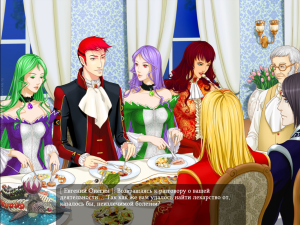This post follows up the point of educational elements in videogames. I would like to introduce one of very special examples – the game ”Evgeniy Onegin” released by Russian videogame company Dreamlore in 2009. This game was designed in a form of a visual novel, based on the original novel from 1825 by one of the most famous Russian writers of all times Alexander Pushkin. The classical novel is compulsory for the junior high curriculum in Russian schools. However, teachers admit that it is quite difficult to make the teenagers read this novel, mostly because it is long and written in old language. So, with the rapid development of videogames in Russia after 2007, Dreamlore studio adapted the novel into the game and designed the main characters according to the Japanese style of ”anime” (as 2008-2009 was a boom of anime culture in Russia, especially among teenagers). The plot of the game is very close to the narrative, however, with some changes and with the ”participation” of the characters from other classical novels by other famous writers on that time)

The game ”Evgeniy Onegin” has different endings, depending on which choices do you make in the game. I used to play this game, and, to tell the truth, the format of a game itself leaves much to be desired – very poor animation, lack of action, moreover, the game received lots of critique because the outlook and the costumes of the characters did not correspond with the fashion of XIXth century in Russia, when the story was set. The characters were dressed in bright clothes, had piercings and unusual hairstyles. There were arguments about authenticity, that the students get a wrong impression from it. In spite of contradictions, I would like to admit, that the idea was quite creative, as ”visual novel” is exotic for the Russian culture, and no other classical masterpiece was re-created in such a unique form of a videogame, with such a unique design of characters, which I find fascinating. This game has become a motivation for the young Russian students to read an original novel. This was very smart of Dreamlore to show the students that old stories can be told in a new way, the way which can be understood by recent generations, in modern times. Even the students, who are unwilling to read classics, got involved into playing and during the process of the game learnt about the chronological order of events in the novel, the relationships between the main characters and their names, which, in my opinion, is a good outcome.